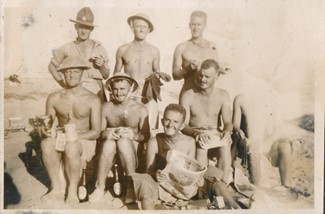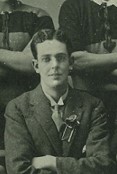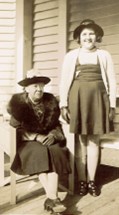
You are not forgotten
-
WWII soldiers in Europe and the Middle East had to suffer periods of tedium when mail was eagerly awaited. Swapping stories, memories, references to common acquaintances, and looking forward to the future kept their thoughts from the dangers ahead – for a short period at least. This is the story of a Cambridge family who preserved their correspondence with friends on active service overseas during a frightening time in New Zealand’s history. The correspondence is now in the care of the Cambridge Museum, thanks to donor Jacqui Darvill.
Minnie Rippon was a great favourite with Cambridge children in the 1930s. Beside the fact that she owned a chocolate shop, she was a generous and kind woman.
She was born Minnie Packer and came to New Zealand in the early 1900s to help her sister Ada. Ada had recently lost her husband and son to TB and was bringing up her daughter Florence alone.
Soon Ada married her second husband, Alfred Brown. Minnie Packer married Mr Rippon and moved to Auckland where she kept a store in Ponsonby.
Ada’s daughter Florence grew up and met William (Bill) Edwards. Bill worked as a barber in Hamilton and would often cycle to Cambridge to see her. He eventually shifted to Cambridge and opened his own barber shop. He loved sports and was involved in rugby, horse racing and rowing. Florence played the piano for the church, silent movies, visiting circuses and other local events. Florence and Bill married and had a daughter Shirley.
Mrs Rippon moved back to Cambridge where she, the Browns and the Edwards all lived together at ‘Salthurst’ on 67 Princes Street. The house was beautiful and had on its walls Goldie paintings and the J Elder Moultray painting “The Fugitives” – now in the collection of the Cambridge Museum.
Mrs Rippon opened a chocolate shop next door to Bill Edwards’ barber shop. When Bill was cutting children’s hair, he would keep them still by telling them that the swordfish head mounted on the wall continued through to the chocolate shop next door, and if the children went there afterwards, they could see the tail. Of course that wasn’t true, but Mrs Rippon would give the children free sweets as a consolation.
Mrs Rippon’s kindness
When Mrs Rippon saw many of her young customers, having grown up and enlisted, head off to the Middle East and Europe to fight in World War II, she vowed to save all her rations and send parcels to them as often as she could. She sent them chocolates, newspapers, handkerchiefs and Aspro, and the Cambridge soldiers loved her for it.
From Gunner N H Brewer to Mrs Rippon in April 1942: “I must acknowledge receipt of several papers etc lately, also parcels. You must send a great swag of things away to your soldier friends. It must be almost a full-time job to procure them, pack them up and send them away. Your parcels are always well packed and they arrive here in perfect condition … I keep in touch with Cambridge affairs by the papers you send me.”
Bill Edwards – Keeping in touch

Bill Edwards
Bill Edwards had bad arthritis and remained in Cambridge in the Home Guard during World War II. He corresponded with Howard (Bush) Hooker, whom he had employed in his barber shop, and with keen fisherman Gordon Entwisle who sent him this letter in 1941:
“Just a few hurried lines to ask you to let me have again the address of your brother & sister in England. If you remember, you gave them to me before we left NZ & I will tell you what happened to them. I put them carefully away in my presentation pocket wallet but as Reg Buckingham is returning shortly, I gave it to him with a few other articles to take back with him. This afternoon I was cleaning my kit bag out & searched each piece of paper looking for it. Then it suddenly dawned on me where it was. I don’t think I will be in a position to make use of the addresses for a good while yet, but it is just as well to be ready. I could probably get them from Bush, but don’t know when I will be seeing him again. Met him a few times since we have been back from the desert, but they left for an unknown destination last week, & it will not be very long before the rest of us have joined them.
Our 2nd echelon lot joined us late last night & now we are a complete unit. It will be far more interesting now carrying out our operations as such. Have not seen many of the Camb boys since coming down here, but they are spread over a big area, & are hard to find.
This last week we had something very unusual for Egypt. It was wet Sat, Sun, Mon & Tuesday. As we couldn’t do anything, we were taken to see military pictures of Abbyssia [sic], & for their kind, they were very instructive. We learn a lot more in 1 hr by this method than we would in a week otherwise. By the way please tell Ruby that Egypt is not spelt Eygpt as she put on my last letter.
How did you get on at Rotorua? I hear that Taupo is fishing fairly well this year as regards condition. Do you put it down to the Labour Govt? Tell Ruby that one of her boyfriends from the orange drink shop at Rotorua is over here somewhere, but I haven’t seen them at all. Will give him her love if I see him.
One of the boys with us now has a game fishing launch at Bay of Plenty & I have been invited to try my hand with a friend for a few days when I return. Do you think you could leave the shop in Ruby’s hands for a few days? Big fish tackle is much cheaper here than back home, & he has ordered a fair bit to be sent home. This includes a reel for £125 for his personal use. In return I have invited him to try the trout at Taupo, & he is looking forward to it, so between us, we will clean a few fish up before we finish.
We have had no airmail now for a fortnight & have no idea when the next will arrive. A few papers arrived tonight, so there must be a surface mail in. As space is limited, papers etc are sorted first so as to give them room to throw the letters around. Still we get all our news now by airmail, but the Freelance is looked forward to & I am fortunate in getting it & the Weekly, 3 Heralds & the local rag sent regularly.
Was amused to see in a recent Herald, from a copy of the local paper, where a black marlin had been caught at Rotorua. Do you know anything about it?
Some of our boys came back from Palestine this afternoon & oranges are now 1 piastre for a chaff sackful. They are rotting on the ground as there are no boats for export, & it has been a good year for them.
Well news is scarce here now so I will have to close down, & will write again from our next position if at all possible. Kind regards to all the family.”
Shirley Edwards’ contribution

Mrs Rippon and Shirley Edwards
Bill’s daughter Shirley was also committed to sending parcels and clothes overseas. She and her friends sent their S.4 teacher Gunner Leslie Bear a cake, and he wrote them a charming letter of thanks:
“I should really scold you for spending money on me when you have relations of your own to whom to send parcels. However, I was so delighted to receive your parcel that I shall have to let you off this time and send you my sincere thanks both for your present and for your good wishes.”
He went on to give them lively descriptions of the customs and habits of Egypt and its people.
After the war, Shirley donated an old coat to be sent to Europe. The coat had her name and address inside one of the pockets, and in 1948 she received a letter of thanks from Helena Matejko from Poland, which Shirley had translated:
“From UNNRA I received from you the coat in a pocket of which I found the address of my donor. For this I am very thankful.
I would like to write something about myself. I am a Pole, thirty-six years of age but really I feel much older, and life for me is at present without any future. My heart is desolate. My husband was taken by Germany to a concentration camp where he was killed. After a few months my only daughter, Danuta, who was fifteen years old died rapidly from meningitis and this was one of the greatest crosses of my life.
At the present time in Poland we have many children without parents and I thought at first to take one of the little ones and adopt it, but from another point of view I am thinking that I would not be able to love the child as my own.
So I am just filling my life by helping other poor people. But I cannot help very much because my health is not very good and we have so many poor people in Poland. I am attending night secondary school for adults after my work and this gives me some pleasure.”
Shirley received several more letters from Helena who was learning English, and you can see improvements in her language as time went by.
In a letter of thanks from Private Edward Chard for a cake Shirley had sent him, he mentioned a letter from Mrs Brown. And the Museum’s collection has a card addressed to Mrs Brown which shows that Shirley’s grandmother was also corresponding regularly.
Warm appreciation
The constant generosity of Mrs Rippon, Mrs Brown and the Edwards family showed the young Cambridge soldiers that they were not forgotten by their friends at home.
Published in the Cambridge Historical Society Newsletter December 2022.
